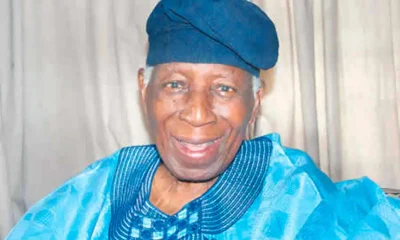News
Why Only 300 Of 50,000 Hardcore Terrorists Arrested By Military Were Prosecuted – DG, NARC

Against the backdrop that statistics and records from intelligence agencies show that out of the over 50,000 hardened and hardcore Boko Haram terrorists arrested by the Nigerian Army and other security agencies, only about a paltry 300 of them have been prosecuted, the Director General of the Nigeria Army Resource Centre, Major General Garba Wahab (rtd) has said that the judiciary arm of the government needs to do more if insecurity is to be eradicated in Nigeria.
Hundreds of thousands of innocent Nigerians have been killed, abducted, raped and forcefully enslaved while houses, properties and government facilities were destroyed by these terrorists leading to millions displaced and in IDP camps but when the terrorists are arrested, little or nothing happens to them.
But speaking during a two-day round table discussion in Abuja at the weekend with the theme “Asymmetrical National Security Challenges, the Army, and National Development”, Gen Wahab disclosed that the judiciary must up its ante and perform its sacred role of dishing out deserved purnishment to terrorists to deter impunity.
His words, “One of the ways to curb insecurity is that the judiciary must be alive to its responsibilities and the local government authorities should be allowed to function.
“It is regrettable that in a Nigerian court, it will take 20 years for a case to be adjudicated upon and persons who have commited clear and glaring offences to be get just purnishment. That’s what is happening. A former president mentioned it saying It takes 10 years for a simple case of stealing to be decided in Nigeria.”
Wahab insisted that the local governments administration should be allowed to function well in the country pointing out that the localization of security in the country would also help in curbing some crimes.
“What we are asking those in government to do is to find a way of ensuring that the judiciary and local government are allowed to function well. When you allow local government to function, then you can localize the security architecture.
“In so doing, insecurity issues will be addressed at the battalion level We should go to the battalion level because these battalions serve the state and so they relate with the state and local government. We shouldn’t wait till we get to divisional headquarters whenever there is a problem. Divisional headquarters in most cases are busy attending to five or six States.”
Gen Wahab also called on the political class to avoid a situation where security agencies will feel that criminal elements receive protection even in instances where personnel are killed or injured through ambushes and other attacks thereby demoralizing the commitments of personnel in operations.
In his remarks, the Executive Director, Defence Space Agency, Prof. Okey Ikechukwu, said the round table seeks to drive a new narrative by getting various segments of Nigeria’s public to see and understand their roles in the wider national ecosystem of synchronized security.
He said, “We will use the round table to re-emphasise the specific and general roles of the military, particularly the Nigerian army, in the cocktail of structures, activities, and processes that constitute the national security architecture”.
He recalled that in April 2024, the Chief of Army Staff, Lieutenant General Taoreed Lagbaja, directed field commanders and troops to be adaptive and embrace innovation to ensure adversaries of the country are brought to their knees.
Lagbaja had noted that that the nation was in a more volatile and complex period than before and tasked Commanders to be innovative.
He also charged them to restore peace and stability in areas experiencing security challenges across the nation
The round table brought together, senior serving and retired military personnel, the media, Nigerian Institute of Public Relations among other stakeholders in the country?
VANGUARD
News
“How we imortalised Olunloyo before his death-Makinde

By Kayode Sanni-Arewa
Governor of Oyo State, Seyi Makinde has said he is happy that former governor of the State, Omololu Olunloyo was imortalised before his demise.
Makinde, in a condolence message by his media aide Sulaimon Olanrewaju on Sunday, said the country had lost a patriotic leader, an icon and one of its most cerebral former administrators with the politician’s demise.
The governor said it is sad that the late mathematical guru and administrator passed away before his 90th birthday.
“This death hits differently because I was looking forward to Baba’s 90th birthday, which would have come up on April 14. However, we have to submit to the will of God, who gives and takes lives as He wills.
“My joy is that our government immortalised and honoured Pa Olunloyo in his lifetime and he was present to witness it as we named the Ibadan Airport Road and the Leisure Park on the axis after him in recognition of his service to the state.
“May the Lord grant repose to his soul and give his family the fortitude to bear his demise,” Mr Makinde said.
The death of Mr Olunloyo was confirmed on Sunday morning through a statement by his family.
The deceased died just a few days before his 90th birthday, according to the statement.
News
Iran turns down Trump’s call for direct nuclear talks

Iran’s top diplomat has rejected direct negotiations with the United States as pointless, his office said Sunday, after US President Donald Trump said he preferred face-to-face talks over its nuclear programme.
Trump sent a letter to Iran’s supreme leader Ayatollah Ali Khamenei last month calling for negotiations but warning of military action if diplomacy failed.
On Thursday, the US president said he favoured “direct talks”, arguing they were “faster” and offered a better understanding than going through intermediaries.
But Iranian Foreign Minister Abbas Araghchi said direct talks made no sense with a country “that constantly threatens to resort to force in violation of the UN Charter and that expresses contradictory positions from its various officials”.
“We remain committed to diplomacy and are ready to try the path of indirect negotiations,” he was quoted as saying in a statement issued by his ministry.
Iran keeps itself prepared for all possible or probable events, and just as it is serious in diplomacy and negotiations, it will also be decisive and serious in defending its national interests and sovereignty.”
On Saturday, Iranian President Masoud Pezeshkian said his country was willing to engage in dialogue with the United States on an “equal footing”.
He also questioned Washington’s sincerity in calling for negotiations, saying “if you want negotiations, then what is the point of threatening?”
Iran and the United States have had no diplomatic relations since shortly after the 1979 Islamic Revolution with some regional countries like Oman playing a mediating role between the two sides.
Letter diplomacy
Trump’s letter was delivered to Iran via the United Arab Emirates, and Tehran responded at the end of March via the Sultanate of Oman.
On Sunday, the chief of staff of the Iranian armed forces, General Mohammad Bagheri, said Iran’s response stressed that “we seek peace in the region”.
“We are not the ones who start wars, but we will respond to any threat with all our might,” he said of the content of Iran’s response.
Western countries, led by the United States, have for decades accused Tehran of seeking to acquire nuclear weapons.
Iran rejects the allegation and maintains that its nuclear activities exist solely for civilian purposes.
In 2015, Iran reached a landmark deal with the permanent members of the UN Security Council, namely the United States, France, China, Russia, and the United Kingdom, as well as Germany, to limit its nuclear activities.
The 2015 agreement — known as the Joint Comprehensive Plan of Action — gave Iran sanctions relief in exchange for curbs on its nuclear programme to guarantee that Tehran could not develop a nuclear weapon.
In 2018, during Trump’s first term in office, the United States withdrew from the agreement and reinstated biting sanctions on Iran.
A year later, Iran began rolling back on its commitments under the agreement and accelerated its nuclear programme.
On Monday, Ali Larijani, a close adviser to Khamenei, warned that while Iran was not seeking nuclear weapons, it would “have no choice but to do so” in the event of an attack against it.
News
Nigerian Army ‘Destr0ys Over 70 Bandits Dens In Taraba, Wastes Three Terrorists’

During the operation, three terrorists were reportedly eliminated, and security forces recovered firearms and logistical supplies.
The Nigerian Army says it has destroyed over 70 camps used by bandits in Taraba State, as part of a continued effort to combat terrorism in the region.
During the operation, three terrorists were reportedly eliminated, and security forces recovered firearms and logistical supplies.
SaharaReporters learnt that the military engaged the terrorists at a hideout in Achelle, situated within the Karim Lamido Local Government Area, as part of their ongoing efforts to dismantle the remaining elements of terrorist groups in the state.
Captain Oni Olubodunde, spokesperson for the 6 Brigade of the Nigerian Army in Jalingo, confirmed the operation, stating that its primary objective was to identify and neutralise dangerous criminals active in the area.
Olubodunde further reported that, in addition to eliminating the three terrorists, security personnel seized an AK-47 rifle, ammunition, and two motorcycles during the operation, which took place on April 5, 2025.
“In continuation of Operation Lafiya Jama’a, a military offensive to remove criminal elements from Taraba State, the brave troops of the 6 Brigade Nigerian Army and Sector 3 Operation Whirl Stroke (OPWS) successfully neutralised three bandits, destroyed several camps, and seized weapons and ammunition during a daring clearance operation conducted in the Karim Lamido Local Government Area on April 5, 2025,” said Olubodunde.
The operation targeted suspected bandit hideouts, beginning in Achelle, where troops carried out a thorough sweep before advancing to Chibi.
As forces reportedly approached Chibi, the bandits attempted to escape but were intercepted. In the ensuing clash, three bandits were eliminated, and multiple makeshift camps were destroyed. Security personnel also seized two motorcycles, an AK-47 magazine, and 13 rounds of 7.62mm special ammunition.
Furthermore, troops conducted extensive searches in the Dutsen Zaki and Achalle areas, where over 70 criminal camps have been dismantled in recent weeks.
According to Olubodunde, no signs of human activity were detected during this latest operation, underscoring the effectiveness of previous security efforts.
Brigadier General Kingsley Chidiebere Uwa, Commander of the 6 Brigade Nigerian Army, praised the troops for their dedication and strategic execution. He reassured the people of Taraba State that terrorists and criminals would find no refuge in the region.
General Uwa also urged residents to remain vigilant while going about their daily activities without fear. He emphasised the importance of maintaining law and order.
He encouraged the public to provide timely and credible information to security agencies, stressing that such cooperation is essential for ensuring the safety of local communities.
-

 Politics9 hours ago
Politics9 hours agoTinubu Gives Fani Kayode, Others New Appointments (See Full List)
-

 News9 hours ago
News9 hours agoDANGER! Ex-Soldier Abubakar Affan Vows to Kill VeryDarkMan ‘Like Deborah Samuel’
-

 News12 hours ago
News12 hours agoWhy NYSC maybe extended by FG- Minister
-

 News22 hours ago
News22 hours agoVOA Halts Operations In Nigeria, Others Over President Trump
-

 News12 hours ago
News12 hours agoIbas moves to rehabilitate damaged Rivers LG secretariats
-

 News9 hours ago
News9 hours agoJust in: Ex-Oyo governor, Olunloyo is dead
-

 Economy12 hours ago
Economy12 hours agoCBN allocates $197.71m into FX market to support naira
-

 News23 hours ago
News23 hours agoPolice rescue 14 kidnapped passengers of Benue Links






